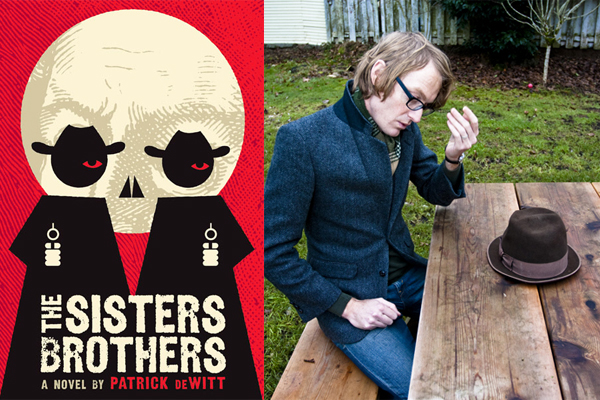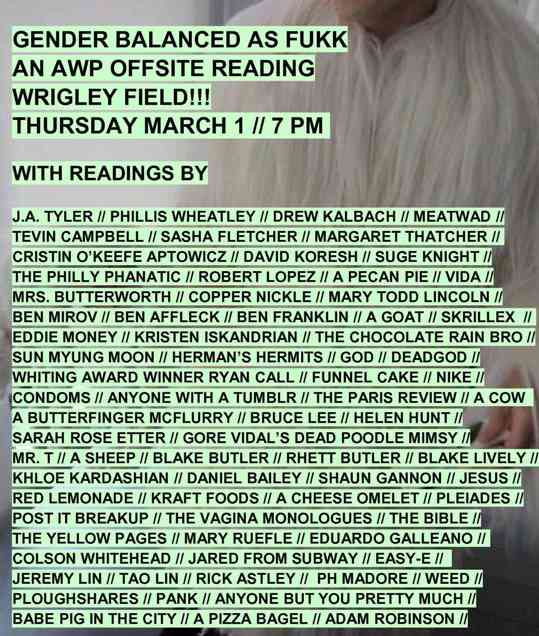Announcing, at long last, the Higgs-Jameson Experimental Fiction Debate!
Chris and I have been going at it for a couple of months now, and we’re pleased to finally bring you Part 1 of our debate over the nature of experimental fiction. Which I’ll put up on Monday. After I finish rewriting Chris’s answers.
Chris will be posting Part 2 sometime after that; we’ll try to do it weekly. Although, you know, school.
Also there will be, like, fifty-million installments. The thing’s the size of seventeen Tao Lin novels.
See you on Monday!
What specter haunts the sentence we’ve created?
Consider this moment in Kate Zambreno’s Green Girl, “For now, Ruth submits to nothingness. My Sleeping Beauty. She lies in bed still and flat, frozen before an unopened day.”
Combine it with that moment when we first meet the sleeping heroine Robin Vote in Djuna Barnes’s Nightwood, “The perfume her body exhaled was of the quality of that earth-flesh, fungi, which smells of captured dampness and yet is so dry, overcast with the odor of oil of amber, which is an inner malady of the sea, making her seem as if she had invaded a sleep incautious and entire.”
Recall the moment of ghostly incantation manifested briefly in Hitchcock’s Vertigo:

Faking it
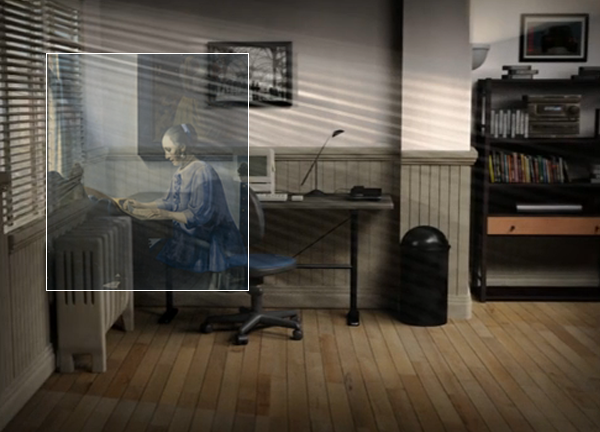
20th century Dutch art forger Han van Meegeren (d. 1947) painted Vermeers and others so convincingly, he duped buyers, including Netherlands officials, an estimated $30 mil (adjusted for today) dollars; most notable of his doings was selling one to Hermann Göring, for which he was arrested by the Dutch government under charges of “collaboration” with the Nazi party, and taken to trial. Ironically, his defense to charges against selling Dutch cultural property (i.e. Vermeer) to the Nazis was that Göring’s recent acquisition had been a forgery, hence not cultural property. Two wrongs, it seems, does make a right. Fortunately, Göring was at Nuremberg at the time and had bigger worries. At the last day of the ruling, even though charges had been dropped, the painter had a heart attack and was rushed to the hospital, at which he had another fatal one three days later. This may have been ringing around in William Gaddis’ mind when he wrote The Recognitions (1955), in which one Wyatt Gwyon realizes he can make more money forging Dutch masters than making originals. Gaddis’ indictment of what would be postmodernism worried itself in a classical context. Under this Faustian pact (the novel, a much shorter version, was initially conceived as a parody of Goethe’s Faust), he slowly loses his identity and completely disappears in the middle of the novel. Gaddis — smart, bitter, both repulsed and smitten by his society, obsessed with documenting its minutiæ — may have found a descendent in Larry David, whose relatively conceptually vigorous and poplulace-friendly shows Seinfeld and Curb Your Enthusiasm seem to me the funnier and perhaps existentially more dire version of a Sartrean “No Exit,” the former collaborators endlessly shouting at one another inside a room, free to simply leave, but never doing so (same goes for The Real Housewives series) — enter empowered and feminist-y Elaine Benes, loosely based off Richard Yates’ daughter Monica, who, in a twist which writes itself, Larry David once dated. When fiction is authenticated by real life, people are appeased, as if what we really wanted all along was the truth. Per the 65th episode in which Elaine brags about never having an orgasm with Jerry, we can only wonder who that inspiration was. A morose pessimist jackhammers his way to ecstasy in under two minutes, and a woman accompanies it with a forgery. Two wrongs, again it seems, does make a right.
Last night in NYC Literature: Erik Stinson and several business associates staring at [a very famous comic book creator] and [the most famous guitarist in early-2000s NYC garage rock] while enjoying a beverage the Playboy March Issue Release party – Boom Boom Room, Standard Hotel.
It was our blood and guts: an interview with Patrick deWitt
Last year, many of us read Patrick deWitt’s excellent Western The Sisters Brothers. The novel (which I reviewed here) concerns two brothers, Eli and Charlie, who hurt and kill men for a living. A great work in a little-appreciated genre, the book went on to win a Governor’s General Literary Award and a Rogers Writers’ Trust Fiction Prize, and was short-listed for the Man Booker Prize. It is newly released in paperback (though I’ll admit I like the hardback’s cover better, and for my part, I read it on the Kindle). He is also, though the interview doesn’t touch on this, the screenwriter behind the recent film Terri. Mr. deWitt was kind enough to spend a little time with some questions I sent him. I don’t know if I touched his soul or anything, but his answers were good, and his book is very much worth your time.
In an interview for the Man Booker Prize, you said: “It would be harder for me to write those same scenes without the twist. In real life, violence is graceless, pathetic, weird, or simply funny. But it’s almost never righteous or noble, and I tried to avoid writing about it that way.” I think a lot about violence, but I’ve never really experienced it myself. The idea that it’s not noble or righteous isn’t too surprising, but “pathetic” and “weird” are two adjectives I’ve encountered less often, I think, and I like them. Reading this made me curious about your experience with violence, and what leads you to see it in the way that you do.
I was never a violent person. It was never something I had any stomach or aptitude or reverence for. I went to a lot of punk etc. shows starting at the age of 12. This was in the San Fernando Valley in the late 80s, and anyone going to these shows certainly saw a lot of violence, though it wasn’t mandatory to take part, and I found it easy enough to skirt. Later on my friends and I got into drinking and drugs, and this was a blood-and-guts period of time, but it was our blood-and-guts. It was ugly but we weren’t, you know, marauders. Later still, working at a bar, fights were common, and these usually matched the description above (pathetic, weird). This was probably where I adopted that attitude toward violence, actually. We’d just stand there and watch. I remember these two meaty white guys with shaved heads going at it on the floor. They’d ripped each other’s shirts off, and a customer looked at me and said, “It’s like babies fucking.” Physical confrontation is just an awkward social interaction taken to the extreme, it seems to me. READ MORE >
Writing on Fashion on Writing: A Plug
Zachary German and Adam Humphreys (who is making a film about Zachary German) have created a “gentleman’s casual clothing line” called Goldfarb and Goldfarb. The brand seems to specialize in humorous, self-nullifying statements printed in simple black Helvetica against white t-shirts—statements which are attributed on the t-shirt to “a t-shirt.”
According to the site’s “regarding” page, Goldfarb and Goldfarb “is an extension of Zachary German and Adam Humphreys’ decades long friendship and aims toward furthering their understanding of their own motives as well as those of the people they love.”
Here are some j-pegs:

Aase Berg’s Transfer Fat
Now available from Ugly Duckling, translated by Johannes Goransson. !!! Hyper-compressed gasoline language. !!! Hungryx99999.
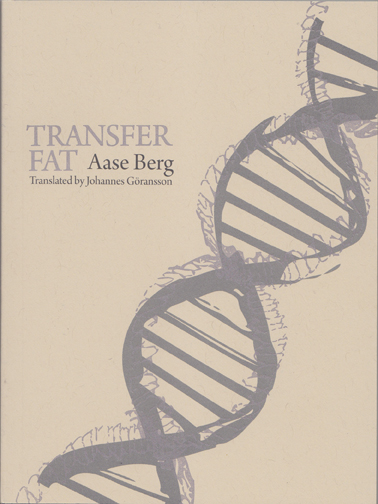
Snowflake and Different Streets
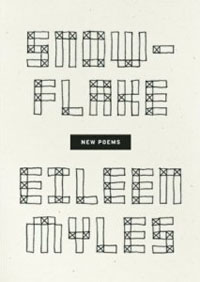 Snowflake / different streets
Snowflake / different streets
by Eileen Myles
Wave Books, Forthcoming April 2012
232 pages / $20 Pre-order from Wave Books
Eileen Myles’ poetry actively, consciously pursues the tangential thought. In her new dual collection of poems, Snowflake and Different Streets, the text glides into the tangent like she has no sense of return, like she’s just floating.
There is confidence behind the lack of linearity and I follow it happily because the text seems to already know that the tangential thought might just be the more exciting thought or as Eileen Myles might say, “the peach of it.”
February 20th, 2012 / 1:00 pm


